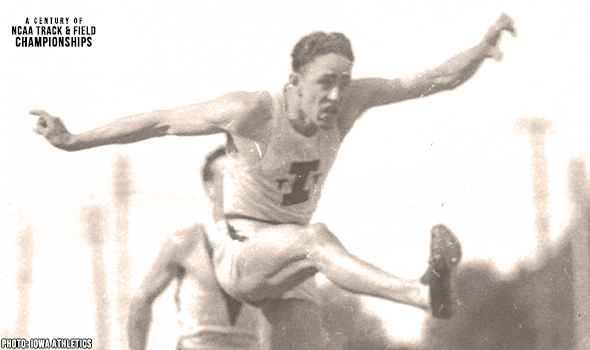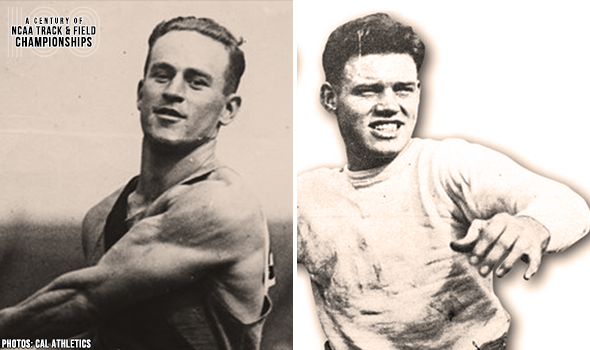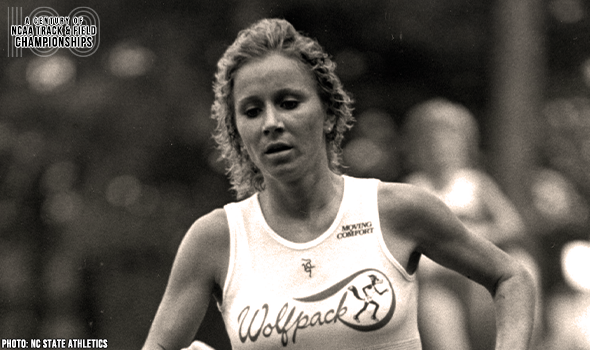
Brookins Hurdled To All-Time Marks
Charles Brookins of Iowa was one of the big stars in the 1923 NCAA Championships, the meet’s third edition held at Amos Alonzo Stagg Field in Chicago.
Brookins ran the world’s two fastest times in the 220-yard low hurdles as he was one of four athletes in the meet to repeat a victory from 1922, when as a sophomore he edged Notre Dame’s Gus Desch in a world record 24.2. Desch, who won the first NCAA 220 hurdles in 1921, had also earned Olympic bronze in the 1920 400-meter hurdles.
That neither of Brookins’ marks from the 1923 NCAA Championships – 23.9 in the heats, 23.6 in the final – was ratified as a world record shows just how much has changed in the sport in nearly 100 years.
It wasn’t just the event, but how it was contested – using the curve for the first portion of the race. The IAAF only ratified straightaway 200/220s (hurdles or sprint) until 1958, and that nearly coincided with when the 220 hurdles was being phased out of the NCAA meet (It was last held in 1959).
Brookins had in fact set ratified world records in the straightaway version – just two weeks earlier at the Big Ten (then known as the Western Conference) Championships he ran 23.2, a mark that would not be surpassed as a world record until 1935, when Jesse Owens ran 22.6 in his Day of Days, also at the Big Ten meet.
Brookins, a native of Des Moines, Iowa, who grew up about 30 miles away in Oskaloosa, won a third-straight Big Ten title in 1924, a year in which there was no NCAA meet so as not to conflict with the Olympic Trials.
He now needed a new event, though, as the 220 lows had long since been replaced on the Olympic schedule by the 400-meter hurdles – not just a longer distance but with hurdles at 36” inches instead of 30”.
Iowa suddenly became a haven for long hurdlers. Iowa coach George Bresnahan – a USTFCCCA Hall of Famer – set up a 400-meter hurdles race a couple weeks before the Trials, but the winner was Hawkeye teammate Chan Coulter, a quarter-miler who shocked in this event at 53.2 when the ratified world record was 54.0. F. Morgan Taylor from nearby Grinnell College was runner-up ahead of Brookins.
Those three made the U.S. team at the Olympic Trials, Brookins also bettering the world record in the heats and semis before losing in the final to Taylor at 52.6, with Brookins (an estimated 52.8) and Coulter following.
A month later at the Paris Olympics, Taylor earned gold while Brookins finished second but was not awarded any medal as he was disqualified for running out of his lane. Taylor’s time of 52.6 was not acceptable as a world record because he had knocked over a hurdle – a rule no longer in force.
Brookins retired from track after winning the 220 hurdles at the 1925 AAU nationals, but Taylor won the 1925 NCAA 220 hurdles and earned two more Olympic 400-meter hurdle berths, including 1932 when he was U.S. flag bearer for the opening ceremony.
The NCAA and collegiate track & field will mark a momentous milestone in the spring of 2021 -- the 100th anniversary of the NCAA Championships and with that, the NCAA Track & Field Championships. In June 1921, the University of Chicago hosted the first track & field championships in NCAA history.
This point can’t be emphasized enough: Not only was the event the first for NCAA track & field, but the first championships for any sport under the sponsorship of the NCAA.
To celebrate, over each of the next 365 days, the U.S. Track & Field and Cross Country Coaches Association (USTFCCCA) will celebrate moments, student-athletes, and coaches that have made a century’s worth of championships special. From humble beginnings to important historical milestones to the modern-day, collegiate track & field has evolved with the American society.
The 2021 edition of the NCAA Division I Outdoor Track & Field Championships begin with preliminary round action on May 27-29 in Jacksonville, Fla., and College Station, Texas. The championships final site and culmination of the celebration is slated for June 9-12, 2021 at the newly rebuilt Hayward Field in Eugene, Ore.

Merchant, Muller Led Cal’s Field Day In 1922
Jack Merchant and Harold Muller combined for six top-5 finishes in five field events at the 1922 NCAA Outdoor Track & Field Championships.

NC State’s Springs Doubles Up Distance Titles
In 1983, Betty Springs became the first woman in the history of the NCAA Division I Outdoor Track & Field Championships to sweep the 5K/10K titles.

“Marvelous Mal” Whitfield Stars Over Two Laps
“Marvelous” Mal Whitfield won back-to-back NCAA 800-meter/880-yard titles in 1948 and 1949.

Ewen Was A True Triple Threat At NCAAs
Maggie Ewen is the only woman in the history of the NCAA Division I Outdoor Track & Field Championships with titles in three different throwing events.

Wanamaker Wins Inaugural Decathlon Title
Rick Wanamaker of Drake won the first-ever decathlon title at the NCAA Division I Outdoor Track & Field Championships in 1970!

SMU’s Connor Bounds To Triple Jump Greatness
It’s been 38 years and still no one has broken the meet record Keith Connor of SMU set in the triple jump at the 1982 NCAA Division I Outdoor Track & Field Championships in Provo, Utah.

Hail Lorenzo! Daniel Sprints To 200-Meter Records
Lorenzo Daniel of Mississippi State made four consecutive appearances in the final of the Men’s 200 Meters and set a collegiate and meet record in his last race.

Talented Twins Dominate Pole Vault Podium
Twin sisters Lexi Jacobus and Tori Hoggard finished on the same podium five times in eight seasons at the NCAA Championships and each won an outdoor title.

Blozis Was A “Giant” In The Shot
“Giant” Al Blozis won three consecutive shot put titles at the NCAA Outdoor Championships between 1940 and 1942.

Cameron Came Close To Standing Alone
Two one-hundredths of a second separated Bert Cameron of UTEP from standing alone in NCAA history.

